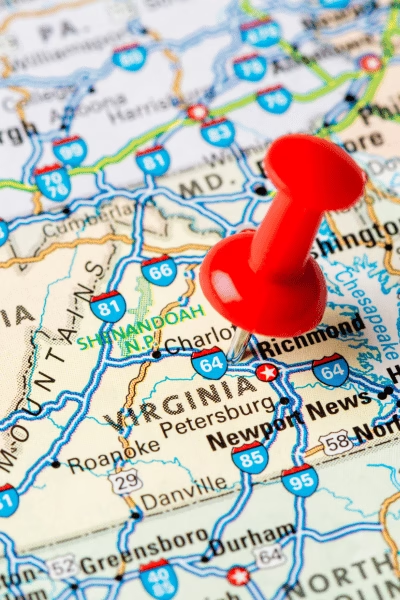As of February 7, 2025, Virginia’s cannabis and hemp industries are at a crossroads. Legislative efforts, regulatory changes, and business shifts are shaping the future of legal marijuana in the Commonwealth. The latest cannabis news in Virginia revolves around new bills in the General Assembly, challenges from Governor Glenn Youngkin, the tightening of hemp regulations, and the evolving medical marijuana landscape.
With lawmakers pushing forward on recreational cannabis sales while the hemp industry faces new compliance requirements, it’s more important than ever for businesses, consumers, and advocates to stay informed about these developments. Your understanding and engagement can shape the future of Virginia’s cannabis landscape.

Legislative Progress on Recreational Cannabis Sales
Virginia made history in 2021 when it became the first Southern state to legalize marijuana possession for adults. However, despite legal possession, the state never established a regulated market for sales, leaving Virginians without a legal way to purchase cannabis unless they were medical patients. That could soon change—if legislative efforts survive anticipated political hurdles.
In a significant move, both chambers of Virginia’s General Assembly passed bills in early February 2025 to legalize and regulate recreational cannabis sales. The Senate approved a bill on February 3, allowing licensed retailers to sell marijuana products to adults 21 and older. The House of Delegates followed suit the next day, marking a major step towards creating a retail cannabis market.
These bills outline a framework for taxation, licensing, and distribution to create a controlled market that prioritizes public safety while eliminating the illicit market. Revenue from cannabis sales would be allocated toward education, public health programs, and community reinvestment initiatives, mirroring models in other legal states.
However, the road to implementation remains uncertain. Governor Glenn Youngkin has consistently expressed skepticism about legal cannabis sales, citing concerns over potential increases in impaired driving, youth access, and crime rates. If he vetoes the bills, lawmakers would need a two-thirds majority to override the decision—a high bar in Virginia’s politically divided government. (Green Market Report)

Regulatory Changes in the Hemp Industry
While recreational cannabis legalization has dominated the headlines, Virginia’s hemp industry has faced its own set of challenges. However, the industry has shown remarkable resilience and adaptability in the face of these hurdles.
In 2023, the state passed Senate Bill 903, imposing strict regulations on hemp-derived THC products such as delta-8 and delta-10. The law capped total THC content at 0.3% and limited packages to no more than two milligrams of THC per serving. These restrictions were implemented in response to concerns over the sale of unregulated, intoxicating hemp products in gas stations and convenience stores.
Many small business owners in the hemp industry have criticized these restrictions, arguing that they threaten the viability of their businesses. Several retailers have faced fines or been forced to remove products from their shelves. In response, a coalition of Virginia hemp businesses filed a lawsuit against the state, claiming the regulations violate federal commerce laws and the 2018 Farm Bill. However, in January 2025, the U.S. Fourth Circuit Court of Appeals upheld Virginia’s restrictions, allowing enforcement to continue. (WRIC)
These new restrictions are expected to drive some businesses out of Virginia or push them toward compliance with the stricter regulations. Despite industry pushback, state officials maintain that these changes are necessary to prevent children and unknowing consumers from ingesting intoxicating hemp products.
Industry Responses and Economic Implications
The cannabis and hemp industries have historically been key drivers of economic growth in states with legal markets. In Virginia, where the retail cannabis market is still in a state of flux, industry leaders and financial institutions are actively exploring new opportunities.
One notable development is the shift in financial support for cannabis businesses. Fairfax-based MainStreet Bancshares, a Virginia-based financial institution, recently announced plans to enter the cannabis banking sector. The move is seen as an effort to bolster the bank’s underperforming banking-as-a-service platform while meeting the growing demand for financial services in the cannabis space. With federal cannabis banking reform still in limbo, Virginia’s financial institutions are positioning themselves to capitalize on the eventual establishment of a legal cannabis market. (Finance Yahoo)
Additionally, Virginia’s illicit cannabis market continues to thrive in the absence of legal retail sales. Without regulated dispensaries for adult-use consumers, many Virginians still turn to unlicensed sources to purchase cannabis. Industry experts argue that establishing a legal framework would help eliminate black-market activity while generating tax revenue for the state.
Medical Cannabis Program Updates
Virginia’s medical cannabis program remains a vital part of the state’s legal marijuana framework. As of 2025, the program serves over 50,000 registered patients, with licensed dispensaries operating across the state. Recent legislative efforts have focused on streamlining the patient registration process, reducing costs, and expanding access to a broader range of products.
One of the most significant changes came in 2022 when Virginia eliminated the requirement for patients to register with the Board of Pharmacy before purchasing medical marijuana. Now, patients can buy medical cannabis immediately after receiving a certification from a licensed healthcare provider. This reform has helped address long wait times and administrative delays that previously hindered patient access.
Industry advocates continue to push for additional reforms, including allowing medical dispensaries to expand operations in anticipation of future adult-use legalization. Some dispensary operators argue that a hybrid licensing model—where medical dispensaries transition into dual-use businesses—would be the most efficient way to roll out recreational sales. However, opposition from Governor Youngkin’s administration makes this transition uncertain. (Virginia Mercury)

Looking Ahead: The Future of Cannabis in Virginia
As Virginia moves forward in 2025, the fate of recreational cannabis sales remains the most pressing issue in the state’s cannabis landscape. While legislative progress has been made, all eyes are on Governor Youngkin and whether he will veto the bills that have cleared the General Assembly.
Meanwhile, the hemp industry continues to adapt to and navigate the new regulations, with some businesses successfully adapting and others considering legal challenges. The medical cannabis market, on the other hand, remains steady but could see expansions depending on future legislative efforts.
Despite the uncertainties, one thing is clear: cannabis policy will remain a hot-button issue in Virginia for the foreseeable future. Lawmakers, business owners, and consumers must stay engaged as the state determines its next steps in shaping a sustainable, regulated cannabis industry.
For more updates on the latest cannabis news in Virginia, stay tuned to Green Appalachia Media.
